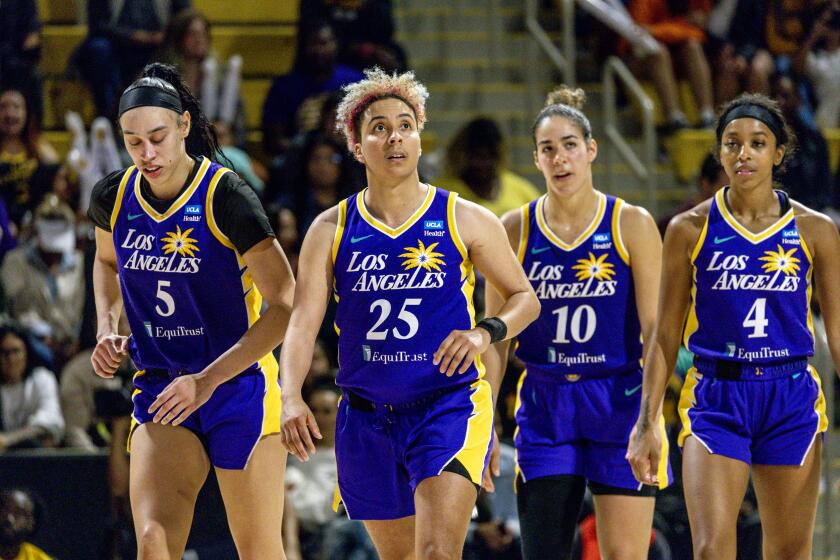Cheating in Little League : Coaches, Officials Say Rules Commonly Are Compromised
Cheating and Little League baseball used to be a contradiction in terms.
Little League was as American as baseball itself. It was free hot dogs and pop at the snack stand after the game. It was living in your uniform so the smell of the baseball field would never go away.
Scandals? Those were for the professionals. Little League was for fun. It was sacred.
In a recent incident in Norwalk, however, a Little League manager was accused of ordering his team to lose on purpose. Parents were shocked. There was an inquiry. Eventually, the coach was cleared of any wrongdoing. A misunderstanding, he said.
But the scars remain. Do such things really happen in Little League?
Coaches and administrators from several Valley-area Little Leagues say they do.
Yogi Riley, a coach in the San Val Little League in North Hollywood, says it is the fault of parents and coaches.
“The kids don’t want to cheat to win. They want to play fair,” she said.
A majority of the officials interviewed expressed surprise at the turmoil in Norwalk. But they also said that for a manager, or even an administrator, to be accused of “bending the rules” is not an uncommon occurence.
“Every Little League coach I know knows that some rules are broken,” Riley said. “I don’t think there is a Little League, high school or American Legion League around that doesn’t have that kind of problem. It’s gotten to the point that I’ve heard and seen so much that I don’t know what a scandal is anymore. They start in Little League and never stop.”
Most coaches and administrators said that eligibility rules are the toughest to enforce and the most frequently broken.
Said Myrna Bookatz, president of the West Valley Little League: “Sometimes, coaches will ask players who they know are from out of the area to sign up. It’s easy to find out that the kid is ineligible, but difficult to prove that the coaches instructions were given maliciously.”
Time limits on the length of games have also resulted in some fudging on the rules, coaches say. For instance, Little League rules state that if a game is suspended on account of darkness during an inning, the inning will start over when play resumes. Runs scored during the top of the inning are nullified.
A team that scores in the top of the innning when it’s getting dark, therefore, might be tempted to cut the rest of the inning short by making outs on purpose. Conversely, the losing team might try to lengthen the inning by making pitching changes in an effort to stall.
“I’ve seen situations like that,” said Roger Lazar, a manager of 13 years in the Conejo Valley Little League. “We used to have a manager we called ‘The Prince of Darkness.’ Every time he would get his team in a position to win he would try every trick in the book to stall. There are a lot of managers who think that if winning wasn’t important, they wouldn’t bother to keep score. . . .
“League officials come down on a person like that when they see it time and again. Usually, that’s the end of it.”
Some leagues, however, have adjusted the rules in order to discourage unfair play.
Doris Shaw, an official at the Encino Little League, said her organization allows an umpire to suspend a game during the middle of an inning. All elements of the inning--including the count on a batter, runners on base and score--all remain the same.
That way, Shaw said, “No over-zealous managers could find benefit in bending the rules.”
Dick Newman, who has been a coach in the Conejo Valley Little League for 10 years, said that he teaches his teams to play to win--but not at all costs.
“As long as you’re keeping score, you always try to win, but there should be limits to those efforts,” Newman said.
“In my years as a manager I’ve discovered that defeat is forgotten awfully fast by kids if their parents let them forget. But you tell a kid to lose on purpose and they get confused. That’s not what he wants to do. He plays for success, not failure.
“Every person who stays in sports long enough experiences losing. Why force it? When you do that, it becomes an adult’s game, not a kid’s game. All of a sudden, it’s not so fun anymore. We’re supposed to play this game according to a certain precept. That means you don’t take advantage of children, or have children take advantage of children.”
Newman said that part of his responsibility as a coach is to understand the psychological needs of the children.
“If you’re a nurturing parent, you ask your child to do his best and if that’s not good enough to win, you try and come back next time,” Newman added.
“The problem is, there are coaches who overdo it. That’s a danger in competitive sports. Some of these coaches have competed themselves and they forget they’re dealing with children.”
More to Read
Get our high school sports newsletter
Prep Rally is devoted to the SoCal high school sports experience, bringing you scores, stories and a behind-the-scenes look at what makes prep sports so popular.
You may occasionally receive promotional content from the Los Angeles Times.







